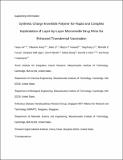Synthetic Charge-Invertible Polymer for Rapid and Complete Implantation of Layer-by-Layer Microneedle Drug Films for Enhanced Transdermal Vaccination
Author(s)
He, Yanpu; Hong, Celestine; Li, Jiahe; Howard, MayLin T.; Li, Yingzhong; Turvey, Michelle E.; Uppu, Divakara S. S. M.; Martin, John R.; Zhang, Ketian; Irvine, Daniel; Hammond, Paula T; ... Show more Show less
DownloadAccepted version (724.7Kb)
Publisher Policy
Publisher Policy
Article is made available in accordance with the publisher's policy and may be subject to US copyright law. Please refer to the publisher's site for terms of use.
Additional downloads
Publisher Policy
Publisher Policy
Article is made available in accordance with the publisher's policy and may be subject to US copyright law. Please refer to the publisher's site for terms of use.
Terms of use
Metadata
Show full item recordAbstract
The utility of layer-by-layer (LbL) coated microneedle (MN) skin patches for transdermal drug delivery has proven to be a promising approach, with advantages over hypodermal injection due to painless and easy self-administration. However, the long epidermal application time required for drug implantation by existing LbL MN strategies (15-90 min) can lead to potential medication noncompliance. Here, we developed a MN platform to shorten the application time in MN therapies based on a synthetic pH-induced charge-invertible polymer poly(2-(diisopropylamino) ethyl methacrylate-b-methacrylic acid) (PDM), requiring only 1 min skin insertion time to implant LbL films in vivo. Following MN-mediated delivery of 0.5 μg model antigen chicken ovalbumin (OVA) in the skin of mice, this system achieved sustained release over 3 days and led to an elevated immune response as demonstrated by significantly higher humoral immunity compared with OVA administration via conventional routes (subcutaneously and intramuscularly). Moreover, in an ex vivo experiment on human skin, we achieved efficient immune activation through MN-delivered LbL films, demonstrated by a rapid uptake of vaccine adjuvants by the antigen presenting cells. These features, rapid administration and the ability to elicit a robust immune response, can potentially enable a broad application of microneedle-based vaccination technologies.
Date issued
2018-10Department
Massachusetts Institute of Technology. Department of Chemical Engineering; Massachusetts Institute of Technology. Department of Biological Engineering; Massachusetts Institute of Technology. Department of Materials Science and Engineering; Koch Institute for Integrative Cancer Research at MITJournal
ACS Nano
Publisher
American Chemical Society (ACS)
Citation
He, Yanpu et al. "Synthetic Charge-Invertible Polymer for Rapid and Complete Implantation of Layer-by-Layer Microneedle Drug Films for Enhanced Transdermal Vaccination." ACS Nano 12, 10 (October 2018): 10272–10280 © 2018 American Chemical Society
Version: Author's final manuscript
ISSN
1936-0851
1936-086X